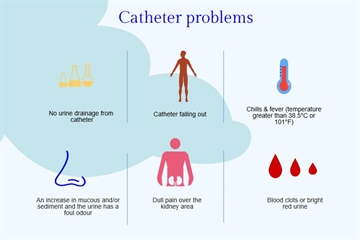What to expect
The hospital staff should arrange for a community nurse to visit you at home to help and give advice on caring for your catheter. This varies depending on where you live in the world. If you have a problem and have not been given the details of the community staff, then you can ring the hospital ward that discharged you for advice.
In the UK the hospital staff will arrange for the district nurse to visit you at home. Sometimes this system does not work as it should! If you do not hear from the District Nurses within 24 hours of your discharge, you should phone them. If you have any difficulty contacting the District Nurse, phone your GP. You should not feel you have to cope alone.
Insert quote from man
What can I do?
Look after your catheter as you have been shown and watch out for any problems. The most common of these are blockage and infection.
Whilst you have the catheter in place you are at a greater risk of developing an infection (called a urinary tract infection or UTI).
Look out for the following symptoms and contact your community nurse, doctor or GP immediately if you experience any of the following symptoms:
2
• No urine drainage from the catheter
• The catheter falling out
• Chills & fever (temperature greater than 38.5°C or 101°F)
• An increase in mucous and/or sediment and the urine has a foul odour
• Dull pain over the kidney area
• Blood clots or bright red urine
• Bladder spasms that do not go away
As you have also recently undergone an operation also contact your GP or emergency service if you experience:
• Pain and swelling in your legs
• Your wound becoming red and painful
How to look after your catheter at home
Some handy tips for looking after your catheter at home:
• Wash your hands before and after handling your drainage bag or catheter.
• Check that there are no kinks or bends in the tubing to stop flow.
• Keep the urine collection bag below the level of your bladder.
• Tape the catheter on the thigh or abdomen to prevent tension
• Shower with your catheter and urine collection bag in place if you wish to.
• Avoid sexual intercourse until your catheter is removed
Read more about caring for your catheter at home
Anything else I need to know?
• You may be sent home with a large collection bag (night bag) rather than leg bags. If this is difficult and interfering with your activities you can get some smaller bags (leg bags) that can be attached to your leg (on the calf or thigh). If you are in the UK ask your district nurse or your GP to prescribe some for you. Insert guidance for other countries.
• Hang the large urine collection bag on the side of your bed at night, if you haven't been given a purpose-made night bag holder some men improvise using a coat hanger or placing the collection bag in a bucket. You just need to ensure the bag is hanging at a lower level than your bladder
• Remember if you are undergoing treatment for cancer in the UK or are receiving treatment for the side effects of current or previous cancer treatment, your prescription costs are free. Leg bags and other catheter supplies are all obtained on prescription from your GP.